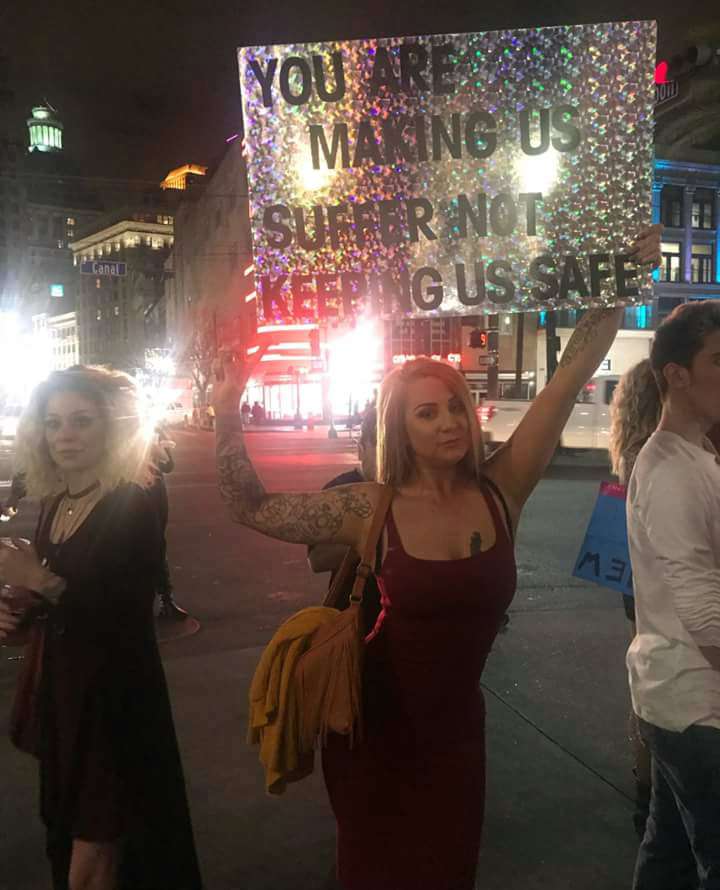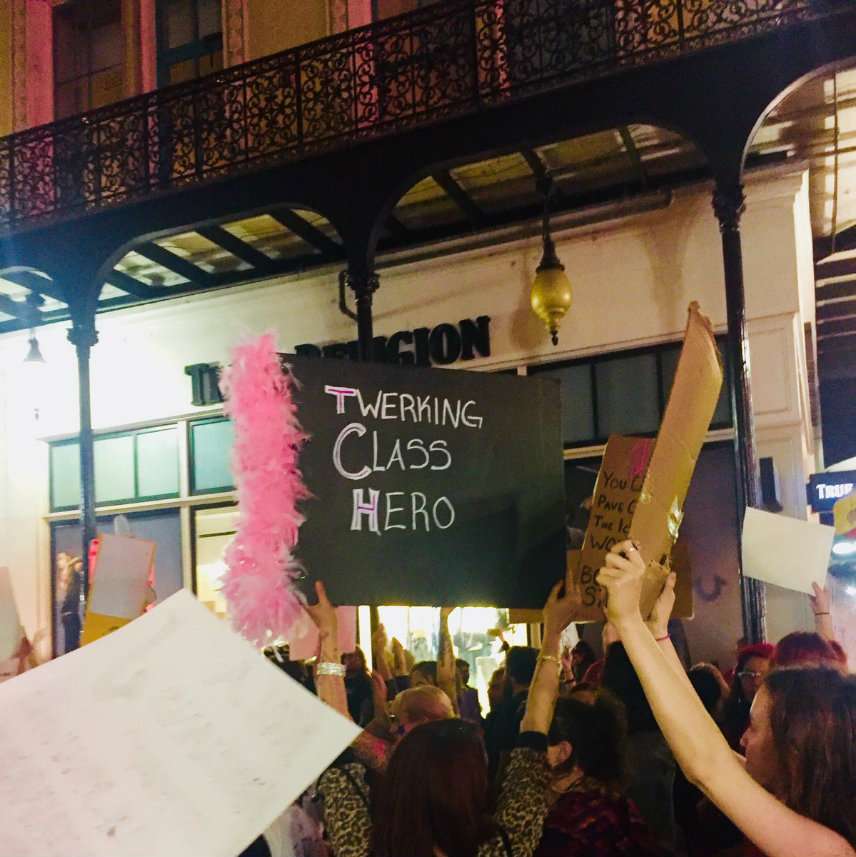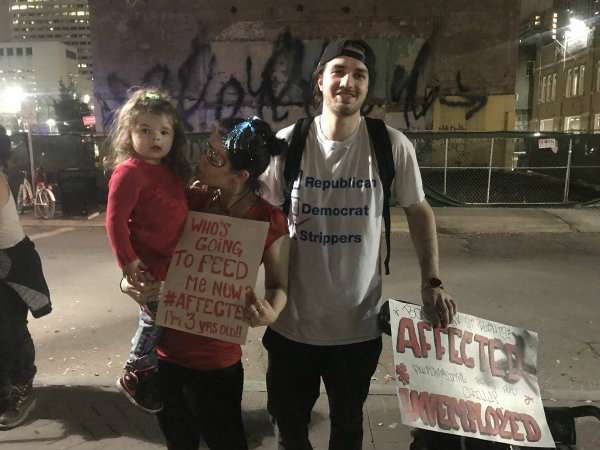'Keep Your Tyranny Off Our Titties,' Say New Orleans Strippers
In a series of protests, strip club workers and their allies are pushing back against abusive policing.

Just in time for Mardi Gras, strippers and their allies have been taking to the New Orleans streets to protest recent police operations at French Quarter strip clubs. The investigations and raids, conducted under the pretense of stopping sex trafficking, have led to the temporary shutdown of eight clubs and are seen by many as part of the city's plans for a more gentrified Bourbon Street.
"Fuck the cops and fuck the raids, all we want is to get paid," chanted some protesters last Wednesday, as Mayor Mitch Landrieu and city officials detailed Mardi Gras preparations at a press conference in the background.
The raids—a joint project of the New Orleans Police Department (NOPD) and the Louisiana Office of Alcohol and Tobacco Control—took place over a 10-day period in January. They were the result of months of undercover operations in late 2017.
New Orleans authorities did not find evidence of underage prostitution or human trafficking, their stated reason for the investigations. The worst they turned up was some dancers offering undercover cops a little more than just a lap dance, and a few instances per club of entertainers baring their breasts or genitals. But this was enough to revoke the businesses' liquor permits, using a law that prohibits alcohol-serving establishments from "permitting any prostitute to frequent the licensed premises or to solicit patrons for prostitution."
As of last Friday, four clubs (Scores, Stilettos, Rick's Sporting Saloon, and Rick's Cabaret) had reached resolutions with the state that would allow them to reopen and serve alcohol again pending a several-week suspension and a $5,000–$7,500 fine. But one club, Temptations, will have its liquor permit permanently revoked. The remaining three are scheduled for hearings this week.
The closures put a lot of dancers and other club employees out of work during the city's biggest tourism season of the year.

Club workers and their allies showed up during a city press conference on January 31 to protest the closures, which they said will hurt them economically and put more people at risk of violence and exploitation.
"Chants of 'Let us dance!' drowning out the press conference," tweeted one attendee.
The next night, hundreds showed up for a protest that wound through the streets of the French Quarter, chanting things like "Keep your tyranny off our titties" and wielding homemade signs. "You Are Making Us Suffer Not Keeping Us Safe" read one. "I May Strip My Clothes But You Stripped My Rights," said another.
Other slogans included "Stop Fucking With Our Livelihood," "Closing Our Clubs Will Only Exacerbate the Sex Trafficking Problem In Our City," "Decriminalize Sex Work Now," "#BourbonStNotSesameSt," and (my personal favorite) "Twerking Class Hero."

"Starting on Bourbon Street near numerous still-shuttered clubs, the protest [ended with a rally] where strippers shared stories of the hardships they've faced without work since the raids and denounced what they said is politically motivated enforcement," reported The New Orleans Advocate. They "questioned why the raids were timed at the start of Carnival and argued that a crackdown on 'vice' in the French Quarter is an attack on the business that fuels the city's tourism industry." And they criticized the city for fighting fake sex trafficking at the clubs when there were plenty of sex workers on the streets who could genuinely use some help.
"While the protest largely focused on the recent raids, it also touched on other issues, including a planned City Planning Commission hearing next week on whether to cap the number of adult businesses in the Quarter, plus a state ban on strippers under the age of 21 that is being challenged in federal court," the Advocate noted.
The City Planning Commission is considering a cap on the number of strip clubs allowed in the French Quarter and ways to reduce the number of existing clubs. Under the proposed motion, drafted by the New Orleans City Council last October, a new strip club could not open in the place of a closing one if there was another strip club on the same block.
"[The police] laughed and said. 'You lost your right to decency when you became a stripper.' I looked at him and was like, 'Every person has the right to decency.'"
-Anonymous NOLA dancer @NOPDNews https://t.co/EFEVjbIOyL— BARE NOLA (@bare_nola) January 29, 2018
The city has justified all this by citing concerns about human trafficking and sexual exploitation.
"The people of New Orleans have been told repeatedly that the months-long investigation and outpouring of law enforcement resources was necessary to uncover widespread sex trafficking in the strip clubs on Bourbon," said Michelle Rutherford, legal adviser for Bourbon Alliance of Responsible Entertainers, in a statement. Yet "neither the undercover investigation nor the raids revealed any instances of trafficking or exploitation of dancers or other women in the clubs."
You wouldn't know that to hear the city authorities talk. NOPD Superintendent Michael Harrison cooed last week after the raids about how his department, alcohol regulators, and state police had "worked together over a period of several months to gather intelligence and build strong cases against criminals using these clubs as a hub for illegal activity." City cops are "committed to keeping Bourbon Street and our entire city free of criminal activity," Harrison said.
"Many see strip clubs as a symptom of the city's dark underbelly, a place of exploitation and abuse," wrote dancer Reese Piper in an op-ed on the raids. "But to me, they represent student loan payments, education and freedom. For the hundreds of people working in the clubs, the crackdowns are a threat to our livelihoods and survival."

For all the months of undercover investigation, ample taxpayer-funded trips to the strip club, and the myriad raids, the only actual violations the clubs were cited for include a handful of dancers per club offering to engage in paid sex acts with undercover police and/or engaging in "lewd acts" such as briefly baring their full breasts or caressing a patron's clothed genitals. At a few clubs, dancers also offered to share or sell marijuana and cocaine with undercover officers.
At Hunk Oasis, for instance, two dancers are accused of flashing their genitals at patrons and one dancer sold a small amount of marijuana to an undercover officer.
At Hustler's Barely Legal Club, officers were allegedly solicited for prostitution six times during their month of visits, saw dancers "encouraging the touching of their [clothed] genitals" by customers on two occasions, and saw employees baring their breasts or genitals five times.
At Rick's Cabaret, officers were allegedly solicited for prostitution five times, flashed four times, and offered a bump of cocaine once during their multiple visits.
These are the sorts of things—done discretely by individual actors—that cost these clubs their liquor licenses, weeks of business, and thousands of dollars apiece in fines. (If widescale sex trafficking had shown up, it might be hard to argue that club management knew nothing. But how the heck are they supposed to know whether a dancer briefly bares her breasts to a customer in a private room?)
This all highlights how arbitrary rules like anti-lewdness laws and strip club regulations can be. A dancer can grind on someone's lap legally but crosses a line if her hand brushes over the customer's clothed penis. She may wear the tiniest of bikinis, but must never expose her nipples for even a second. These are silly distinctions to begin with, made even sillier by the fact that New Orleans cops would spend months of undercover operations enforcing them—especially in a neighborhood where curbside flashing for beads and drinks is commonplace.


Show Comments (61)